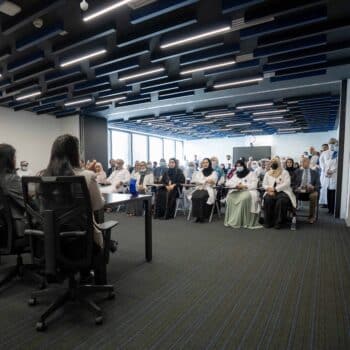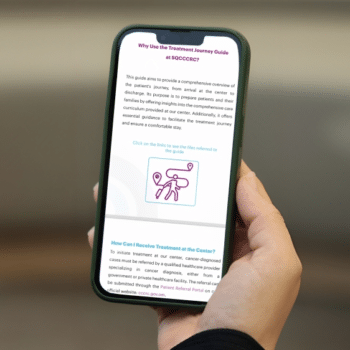Do not worry.. Cancer is not stigma!
Article: Dr. Zena Marwan Al Sharbati – Senior Specialist -A- Clinical Psychology
Stigma has been defined as a process in which a person is perceived as a broken, labelled collection of several parts, rather than a whole human entity (Goffman,1963). Linked with stigma are feelings of shame and inferiority (Lim & Tan, 2014; Noroozi et al., 2018). Stigma can be associated with any phenomenon or characteristic that members of a society look down upon. Stigma associated with an illness is typically projected upon people suffering from a certain illness (Scambler, 2009).
Akin-Odanye and Husman (2021) conducted a systematic review (SR) to explore the extent of stigma linked with various types of cancers as well as efficacious interventions that address cancer related stigma. Their systematic review included studies from all over the world including but not limited to: North America, Africa, Asia, Europe, South America, and Australia. The researchers found out that cancer related stigma is a world-wide phenomenon and is found among various segments within the society. For example, the stigma was not only found within community settings but also among healthcare practitioners, people from high socio-economic statuses, the media, family and friends of people with cancer, as well as policy makers.
From my clinical experience in the field of psycho-oncology as well as the experience of my colleagues, we also agree with our colleagues from other parts of the world about the presence of cancer related stigma within our Omani clinical as well as non-clinical settings. A recent Omani study conducted by Al-Azri and Al-Awaisi (2022) also implicitly indicated that cancer related stigma could be linked to late-stage presentation and diagnosis among Omani women with breast cancer.
Unfortunately, cancer related stigma has been translated into inhumane treatment of people with cancer that include negative labelling based on changes in the physical appearance (Scambler, 2009), psychological as well as emotional mistreatment by their families and the society (Gupta et al., 2015; Meacham et al., 2016; Solikhah et al., 2020; Nyblade et al., 2017; Trusson & Pilnick , 2017). Consequently, cancer related stigma is a complex term which needs special consideration on multiple levels.
One of the psychological theories within health psychology literature which has helped us to understand the impact of stigma associated with negative illness perceptions of cancer is the Common-Sense Model. The Model theorizes that a person’s perceptions of an illness will impact various emotional as well as behavioural outcomes such as levels of anxiety and depression and quality of life. Illness perceptions include a person’s thoughts of the illness. Five main dimensions have been studied in the literature: the perceived identity of the illness (i.e. cancer equal to death), the perceived consequences (what does the patient think about the consequences of the illness), timeline (how does the patient perceive the timeline of the illness/chronic versus acute), controllability (how much control does the patient perceive he/she has over the illness), and the causes of the illness (is it perceived as fate, evil eye, or purely due to genetic causes/or lifestyle) (Hagger & Orbell, 2022). It is important to emphasize that these perceptions are merely thoughts; they do not reflect facts about the illness. Research has shown that the more severe and negative illness perceptions are, the worse emotional and behavioural outcomes are expected. For examples, linked with more severe illness perceptions are higher levels of anxiety, depression, less compliance to treatment, and poorer quality of life (Al-Sharbati, 2020).
Therefore, and based on what have been discussed so far, it would be helpful to start addressing the stigma related to cancer by correcting negative and severe illness perceptions via culturally sensitive campaigns which do not further increase the stigma against people with cancer and their families. Additionally, healthcare providers may need to open discussions with people with cancer and their families about their illness perceptions in order to correct negative and biased ones (Al-Sharbati, 2020).
Clinicians within the oncology settings need to be on board by utilizing a sensitive approach to clinical communications and avoiding the use of words that downplay cancer such as “inflammation” (Gregg, 2011). Also, healthcare providers need to be aware of the various social factors affecting the etiologic and maintenance of cancer related stigma. Moreover, researchers need to design and implement interventions that address cancer related stigma. Additionally, policy makers also have a role in designing policies that prevent discrimination against people with cancer in various settings (Akin-Odanye & Husman, 2021).
People with cancer could cope with the stigma related cancer via the utilization of various coping skills which could be meaningful to them. For instance, seeking social support from close friends and family members could be one way to help them cope. Additionally, emotionally based coping skills such as venting out, recording thoughts and feelings, distraction, and reframing the situation could also be helpful. Moreover, it is also important to encourage people with cancer to seek professional psychological support with a qualitied psychologist. As for the SQCCCRC, we have a psychosocial team addressing the psychological as well as the social needs of people with cancer and their families. Additionally, open communications with people in their social network about what makes them uncomfortable can be pivotal and reduce the negative impact of stigma related to cancer. In other words, drawing emotional boundaries is pivotal. Finally, it is important to utilize faith, and more specifically, positive religious coping to help them find meaning in their illness experience.
References:
Akin-Odanye, E. O., & Husman, A. J. (2021). Impact of stigma and stigma-focused interventions on screening and treatment outcomes in cancer patients. ecancermedicalscience, 15.
Al-Azri, M., & Al-Awaisi, H. (2022). Exploring causes of delays in help-seeking behaviours among symptomatic Omani women diagnosed with late-stage breast cancer-A qualitative study. European Journal of Oncology Nursing, 61, 102229.
Al-Sharbati, Z. M. (2020). The utility of an integrated model to explore the mediating role of religious coping between illness perceptions and psychosocial outcomes of Omani women newly diagnosed with breast cancer (Doctoral dissertation, University of Strathclyde).
Goffman, E. (2009). Stigma: Notes on the management of spoiled identity. Simon and schuster.
Gregg, J. L. (2011). An unanticipated source of hope: stigma and cervical cancer in Brazil. Medical Anthropology Quarterly, 25(1), 70-84.
Gupta, A., Dhillon, P. K., Govil, J., Bumb, D., Dey, S., & Krishnan, S. (2015). Multiple stakeholder perspectives on cancer stigma in North India. Asian Pacific journal of cancer prevention: APJCP, 16(14), 6141.
Hagger, M. S., & Orbell, S. (2022). The common sense model of illness self-regulation: A conceptual review and proposed extended model. Health psychology review, 16(3), 347-377.
Lim, K. S., & Tan, C. T. (2014). Epilepsy stigma in Asia: the meaning and impact of stigma. Neurology Asia, 19(1).
Meacham, E., Orem, J., Nakigudde, G., Zujewski, J. A., & Rao, D. (2016). Exploring stigma as a barrier to cancer service engagement with breast cancer survivors in Kampala, Uganda. Psycho‐oncology, 25(10), 1206-1211.
Noroozi, M., Noroozi, A., Farhoudian, A., Mohammadi, F., Higgs, P., Rahmani, A., … & Armoon, B. (2018). Factors associated with HIV testing among people who inject drugs Tehran. Journal of Substance Use, 23(3), 322-326.
Nyblade, L., Stockton, M., Travasso, S., & Krishnan, S. (2017). A qualitative exploration of cervical and breast cancer stigma in Karnataka, India. BMC women’s health, 17, 1-15.
Scambler, G. (2009). Health‐related stigma. Sociology of health & illness, 31(3), 441-455.
Solikhah, S., Matahari, R., Utami, F. P., Handayani, L., & Marwati, T. A. (2020). Breast cancer stigma among Indonesian women: a case study of breast cancer patients. BMC women’s health, 20, 1-5.
Trusson, D., & Pilnick, A. (2017). Between stigma and pink positivity: women’s perceptions of social interactions during and after breast cancer treatment. Sociology of Health & Illness, 39(3), 458-473.





